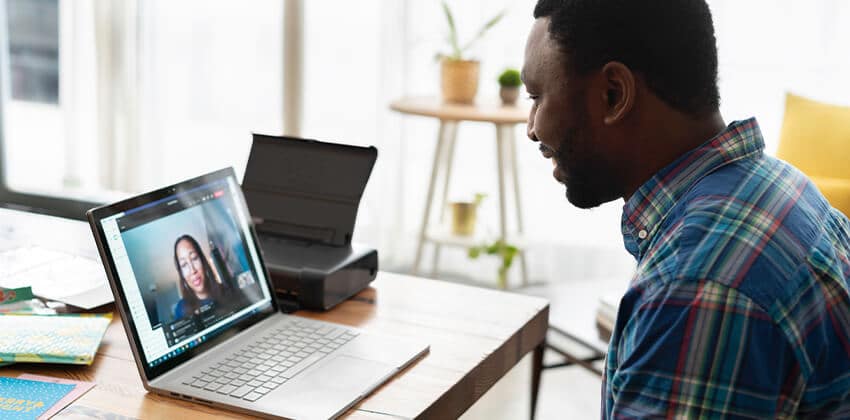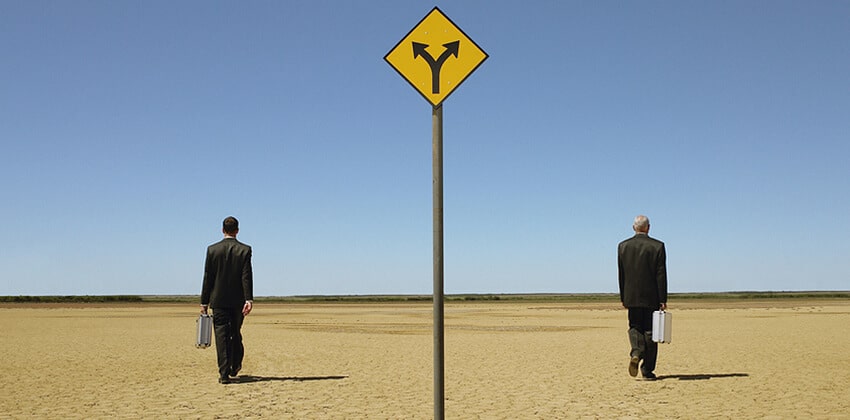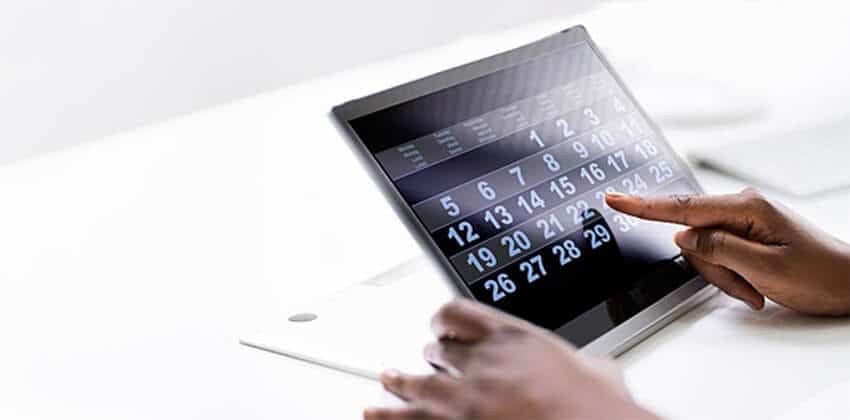
Hiring managers are currently knee deep in crisis management.
Their key concern in job interviews: How can you assist them in solving their problems during the pandemic?
That is THE question to be prepared to answer.
Seize this interview as the opportunity and demonstrate your ability to be nimble, to deal with ambiguity, and to show calm in the middle of this storm.
The World Has Changed and So Have the Interview Questions
Expect several questions aimed at your remote-work technical savvy, and ability to be self-directed without the infrastructure and management support available in a physical office.
Conventional advice surrounding interviewing has always included the need to prepare for questions an interviewer is likely to pose, as well as those you are eager to ask.
But do not assume you can just simply dust off those questions used in the past because new ones are headed your way, and you will have new questions of your own to ask.
The more traditional questions will remain in the mix. Spend time reviewing Smart Answers to Common Interview Questions and Smart Strategies plus Sample Answers for Behavioral Interview Questions. Also be prepared to ask your own COVID-related interview questions to understand how the employer manages the new work environment.
Anticipate a different focus in three primary areas representing top-of-mind issues:
- Safety
- Remote work
- Management processes
Get ready, know, and practice your responses.
Your answers should demonstrate not only the relevance of your experience, but also the currency of your knowledge about the evolving employment landscape and your ability to adapt to the new reality.
Before the pandemic, approximately 5% of employees worked from home. During the pandemic, that number increased to 40% and around 20% have the potential to permanently transition to working from home. As things improve, assume that companies are phasing in their return-to-work plans and will rely on remote workers for the next several months.
Be Prepared for a New Kind of Interview
Take the new video interviews seriously. Many tales have emerged from job seekers experiencing a relaxed setting for interviews conducted via video conferencing post-COVID.
I have witnessed stories of interviews being conducted with the hiring manager rocking a child on their lap, panelists trying to corral their kids during an interview, and dogs scurrying in the background.
You cannot control how the employer’s representatives choose to behave, but YOU must continue to follow professional protocols for digital meetings. Business attire, no distractions, and quiet on the set!
Do the traditional homework needed and gather intelligence from a variety of sources: colleagues, employees, LinkedIn connections. Pay special attention to the employer’s Twitter feed to see how they are communicating with stakeholders about their response to pandemic issues.
Many employers have posted details of their back-to-work plans on their websites. Access a company’s website and carefully read their COVID-19 Response if one has been posted. Also check out the CDC Guidelines for managing the pandemic.
Gain an understanding of both the government and employer’s response to COVID-19. Find answers to your questions contained in these documents before you arrive at the interview. You can then focus on additional questions related to return-to-work topics either not included in the guidelines or for which you need clarification.
Questions Before Attending an In-Person Interview
Although an overwhelming majority of interviews are being conducted via video conferencing and phone, on-site interviews do occur. When invited to an in-person interview, ask these questions before the meeting:
- Should I bring a mask and/or gloves with me to the interview, or will PPE be provided once I arrive?
- How will I gain entry to the office/office building?
- Are there any additional safety rules I should be aware of before arriving?
These requirements will likely change over time, but be sure you feel comfortable with how the employer manages the in-person interview situation. That will give you insight into the working environment when you are onsite.
Observe how the employer and the employees seem to be responding to the coronavirus management best practices.
The Employer’s Questions for You
The employer will want to understand your experience working remotely and how well you have adapted to this new requirement. Your participation in a video interview will demonstrate your understanding of how to use the technology as well as how well-connected you are to the internet (or not).
1.Have you ever worked remotely? If so, what changes did you make to adapt to an at-home work environment?
Companies want reassurances that you have a dedicated workspace and can be productive from home. Do you have the proper connectivity to conduct business on their behalf?
While you should not reveal your personal situation (kids, home schooling, etc.), you can indicate that your environment is free of distractions, allowing you to execute work on a timely basis.
Consider: Build out your resume and LinkedIn profile to include remote work experience. If you are a recent college grad, refer to your success at online learning.
Add the terms “remote work” and “work from home” to your LinkedIn profile plus the technologies you have used, like Zoom, Skype, and Google Meet. Those are valuable keywords being searched much more frequently now. Other keywords critical for today’s job market include self-directed, agile, worked in, or managed distributed teams. Read How to Job Search Effectively for Remote Work for more details.
2.What aspects about working from home did you enjoy, and which did you find most challenging?
An employer will get better insight into the kind of work environment you thrive in-home or office. The other aspect they may be probing is your comfort level with the technology used to conduct business — Zoom, Microsoft Teams, even basic technical trouble shooting (e.g. recovering from printer problems, scanning, etc.)
An employer’s workforce planning may not just address filling vacancies but also include identifying positions/employees who would be eligible for permanent remote work. What are you looking for?
3.When working remotely, how do you organize your day?
It takes self-discipline, and no set of eyes are supervising your work each day. So, explain your daily routine. This will be easier to answer if you have had experience with a remote job. An employer will be assessing how much hand holding you may need vs. your ability to work autonomously.
4.What ways would you communicate with your manager and co-workers in a remote setting?
First, express an understanding of the accountability needed and the reporting expected on a regular basis when working remotely. Give examples of how you have kept in touch. Do not assume you know the new manager’s personal style.
Be prepared to demonstrate how you will collaborate with team members to get things done. Give specific examples.
5.What are your thoughts on how our teams can collaborate and how we can interact with clients safely once we return to work?
Organizations have, or are now formulating, the ergonomic plans for conference rooms, workspaces, common areas, and are interested in how forward thinking you are. Employers are also gathering input from current employees and candidates to help shape, then support plans they will be implementing to reconfigure office space. Be prepared to share your vision of a safe workplace.
If travel was a significant component of a job, offer views on how to travel safely and/or alternate ways to keep clients and stakeholders engaged.
6.How have you handled the stress of Coronavirus?
Acknowledge the reality of the stressful situation and explain your coping techniques. Do you have a positive outlook? What are the ways you have used to deal with stress? Daily walks? Meditation? Connecting with friends?
Employers will probe your ability to be productive in light of stress — this will not be the only time you will face a difficult situation. You may want to also use this opportunity to ask how they are supporting employees who may be dealing with stress related to isolation.
7.What would you personally do to maintain safety in the workplace?
The employer is not solely responsible for keeping the workplace safe. They will also depend on their employees. How do you practice safety in your personal life? Hand washing? Social distancing? What would you do if you saw someone at work engaging in an unsafe practice?
Companies are focused on the health of employees but are also concerned about the liability if a worker gets sick. Demonstrate your willingness to participate in making it a safe place to work.
8.What life lessons have you learned during the pandemic?
This question resembles the classic one concerning how you dealt with a difficult situation. Are you taking advantage of the free online resources offered — webinars, podcasts, etc.? Did you assess the viability of the industry you were in and determine if a career change is needed? Have you developed a greater appreciation for the value of other people? Does networking make more sense now following time in isolation?
Employers cannot grow unless the employees invest in personal and professional development. Tell them the positive impacts the pandemic has made in your life, like learning the new skills and technologies to successfully work remotely.
9. Will you be willing to work in an office again when/if working remotely is no longer required?
Since managing remote employees is a relatively new concept for many organizations or not practical, long term, for the work they do, an employer may be hoping to return to a more “normal” work environment. If they are able to do that, they will want to know if you will be comfortable with that change to a more traditional work environment.
After the Interview
The biggest mistake candidates make is missing an opportunity to keep the door open after the interview. Typically, a thank you e-mail is sent, and then the long, agonizing wait to hear back from the hiring manager begins.
The most critical time for decision making occurs after the final round of interviews, so why go silent now? Show the interviewer you are a problem solver, listened to their needs, and are willing to find creative ways to be a stand-out candidate.
High unemployment and increased competition call for a more proactive approach in your follow-up to stand out from the other candidates, demonstrating your interest in the opportunity as well as the quality of your work
In addition to sending your thank you notes/emails, follow these easy steps to move to the front of the line:
At the close of the interview, ask the interviewer if you may call should you have any additional questions (and you will have questions). Ask for the best time to call and best phone number to use.
The follow up call is used to continue the conversation, convey a solution to a problem discussed in the interview, or clarify a point that may have been left open-ended. Immediately jot down your notes after the interview. Identify 2 to 3 areas where you could add value and prepare examples of what you have already done or would propose to do in the future.
Wait 3 to 4 days for your follow up call. Remember, you will not be viewed as the dreaded “stalker” because you already got permission to call the interviewer.
Consider: Here’s an example of a follow-up call: You answered “No” when asked, “Have you ever worked from home?”
After the interview, you realize that you failed to mention that while working in an office, you did operate remotely by managing a distributed team of workers who were located elsewhere. In that capacity, you held weekly video conferences, reduced travel expenses more effectively using technology, and maintained collaboration within the group.
This example is MUCH better answer, and you can share that experience in the follow-up phone call..
The Bottom Line
Employers are hiring, but they often have many applicants to choose from. With your answers and your preparation, demonstrate to the employer that you cam successfully do this job in spite of the complications caused by the pandemic.
More About Coronavirus Pandemic Job Interviews
- How to Succeed in Coronavirus Job Interviews
- Questions to Ask Employers in Coronavirus Pandemic Job Interviews
More About Job Search During the COVID-19 Pandemic:
- Guide to Coronavirus Pandemic Job Search
- Coronavirus Pandemic Job Interviews
- 5 Steps to Successful Job Search During the COVID-19 Pandemic
- How Hiring Happens During This Pandemic Quarantine
- How to Job Search Effectively for Remote Jobs
- Key Coronavirus Pandemic Network Building Strategies
- Effective Job Search Networking During the COVID-19 Pandemic
- Top 100 Employers
More About Job Interviews:
- How to Ace Your Video Interview
- 12 Keys to One-Way Video Interview Success
- 9 Secrets for Nailing Your Phone Interview
- How to Succeed in Your Phone Interviews (a.k.a. Phone Screens)
- Smart Answers to Common Interview Questions
- Smart Strategies plus Sample Answers for Behavioral Interview Questions
- How to Answer, “Do You Want to Tell Us Anything Else About Yourself?”
 About the author…
About the author…
Barbara Schultz is an HR executive, career coach, writer, and co-author of Adulting Made Easy(er): Navigating from Campus to Career. Barbara has held senior HR leadership roles in entrepreneurial settings and gives a unique perspective to job seekers from a life spent on the “other side of the desk.” She is also the owner of CareerStager.com, helping people successfully navigate their careers. Follow Barbara on LinkedIn.
More about this author…
Don't forget to share this article with friends!




